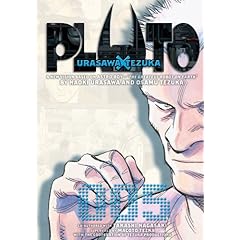
I'm behind again, but not too far! Naoki Urasawa's Pluto has been blowing my mind all year long. The sixth volume (of seven collected editions) should be in American stores this week and I believe the conclusion is due in January. If you have not been reading this, you are missing one of the two or three best comics of the year, and you would do well to hop on now so that you can enjoy the mayhem as it wraps up next year with everybody else.
Now, if you haven't been following along, Pluto is a contemporary adaptation of a 1960s Astro Boy story called "The Greatest Robot in the World," in which some unseen force starts wiping out the planet's most powerful robots. Several years previously, most of them saw combat during a war in the Middle East that saw the region devastated and a hated dictator in UN custody. Now working civilian jobs and beloved by the public, the robots and human scientists must discover what force is targeting them before it's too late...
Pluto is structured like a murder mystery and much of the action follows Gesicht, an indestructible humanoid who works as a police detective for Europol. Gesicht's chief concern is that a robot has found a way to violate its prime directive against killing humans, because whatever this thing that's attacking robots might be, it's leaving a trail of corpses in its wake as well. Simultaneously, Gesicht is targeted by a hate group that's out to avenge a human death that the detective once caused himself in the course of an investigation, and has found a willing patsy: the dead man's brother.
Urusawa has really mastered a style of slow-burn storytelling where every revelation and development feels like a kick in the stomach. There's a overpowering sense of doom on every page, with a situation that just gets worse and worse. He's crafted such vibrant, sympathetic characters in his story that I found myself turning pages frantically in worry, particularly when two of the robots, Hercules and Epsilon, meet on a clifftop, preparing to confront their enemy.
It's a stunning mix of genres which will appeal to fans of literary SF or detective fiction as well as traditional action comics. Gesicht's storyline, for example, reminds me of the novels of Isaac Asimov that starred Elijah Bailey and his robot partner Olivaw. Urusawa tells his story beautifully and the artwork is just amazing. He's clearly one of the major talents working in modern comics, and I highly recommend you check out his work.
No comments:
Post a Comment